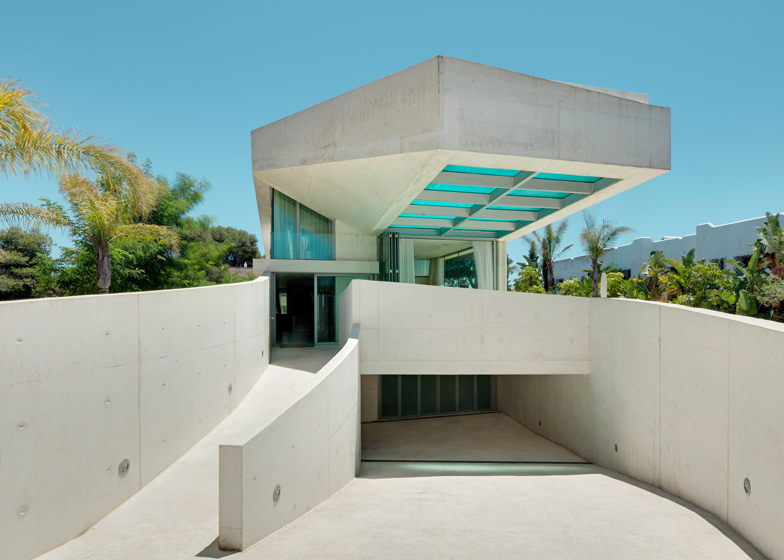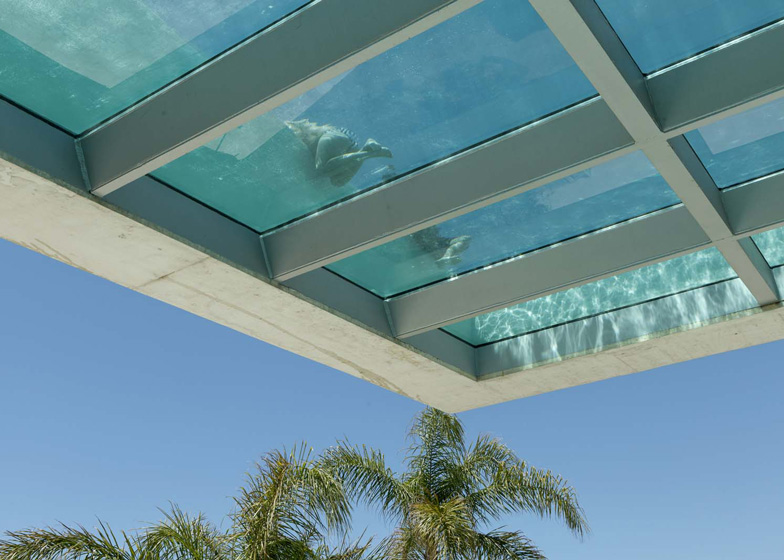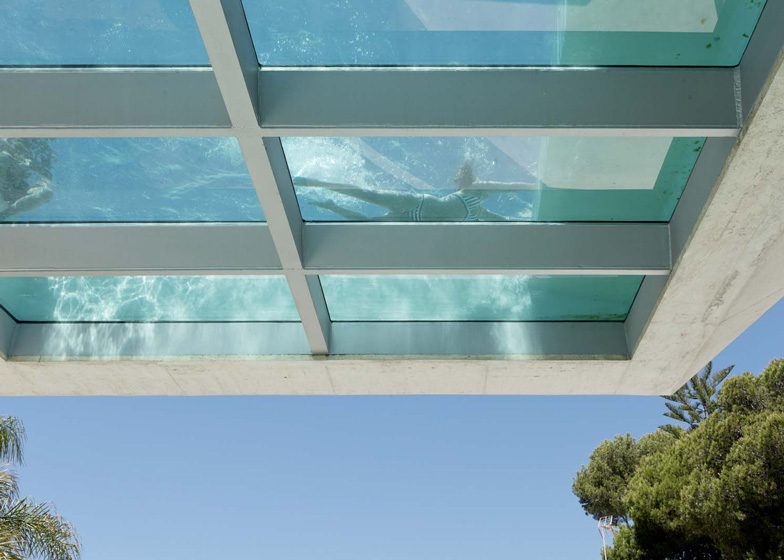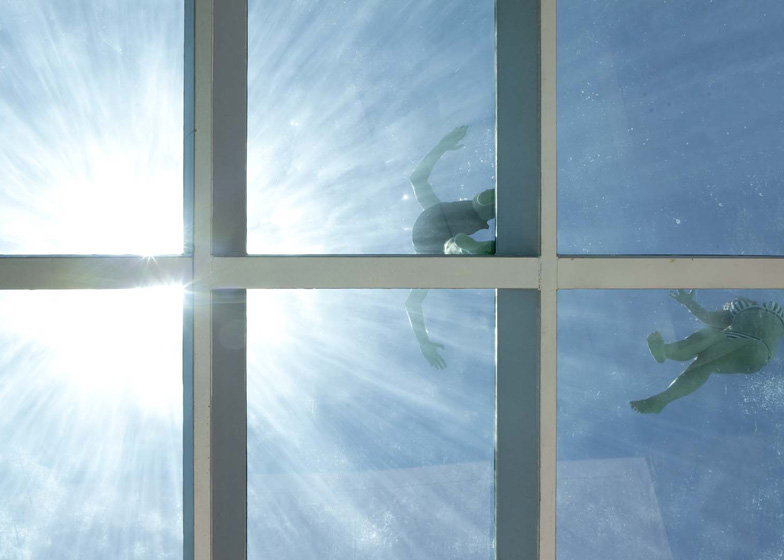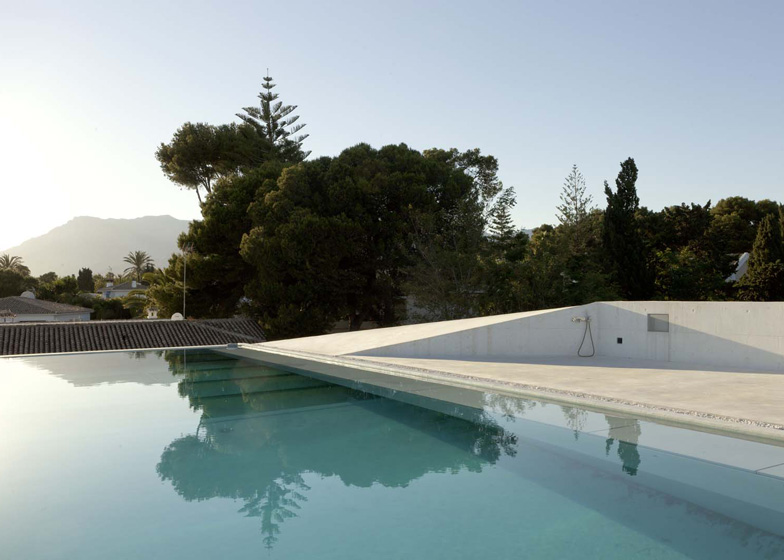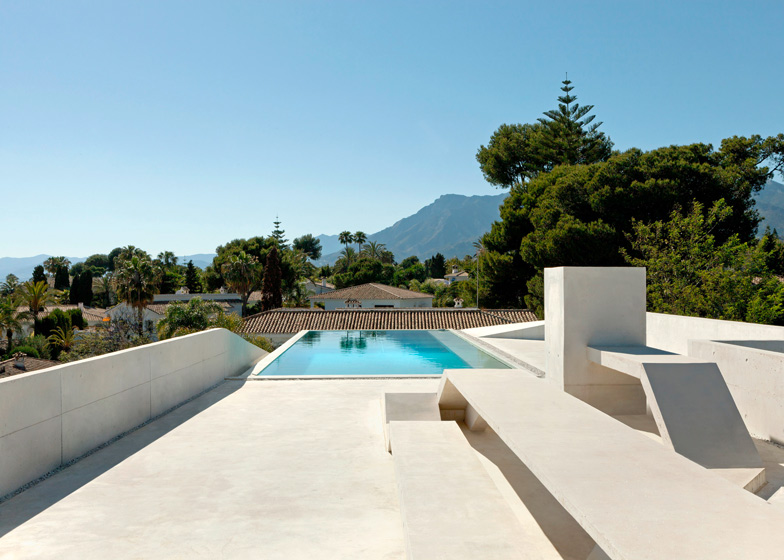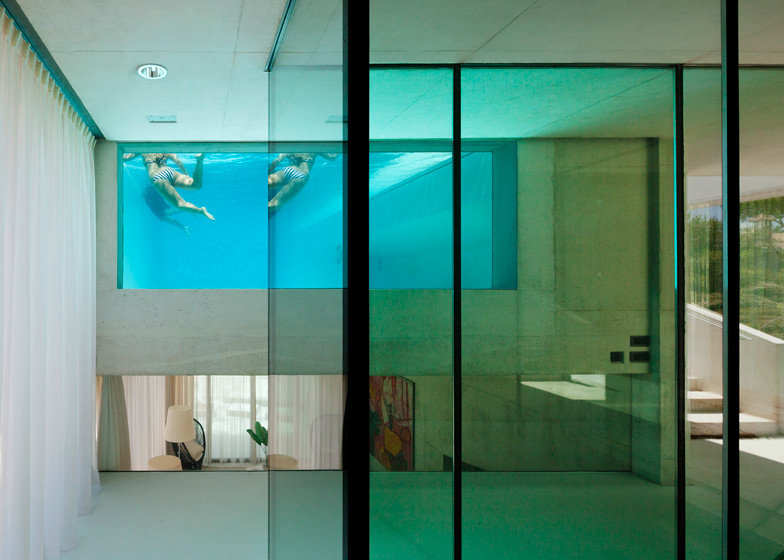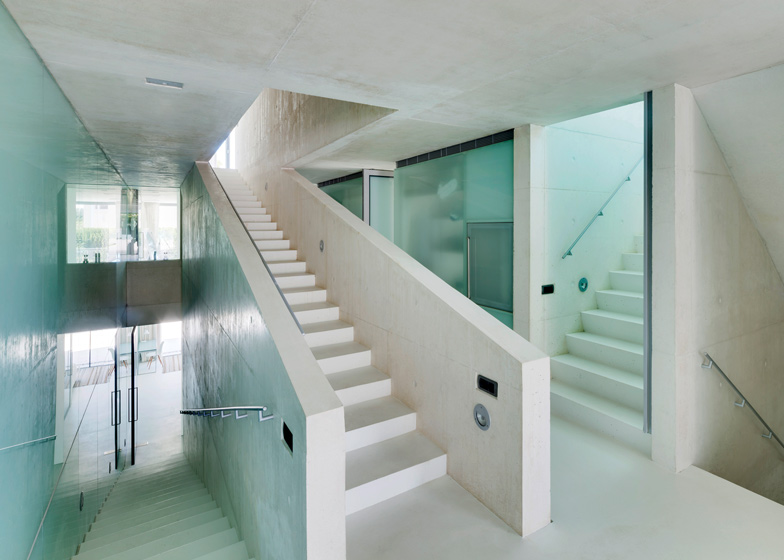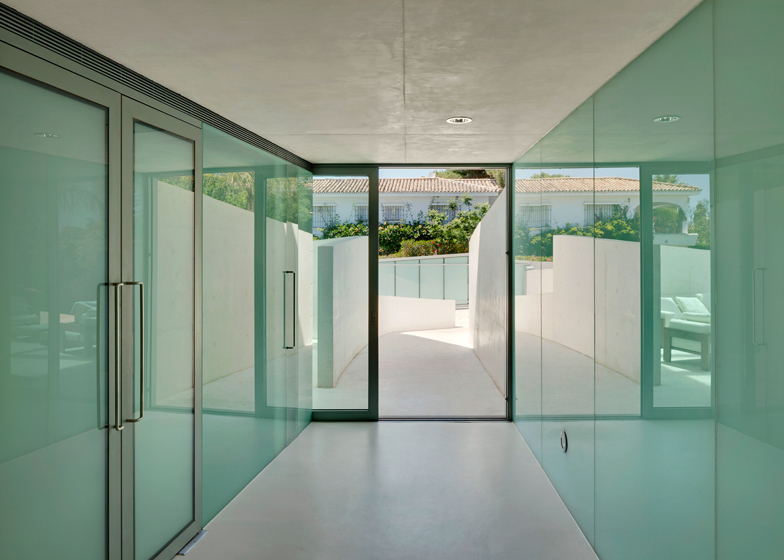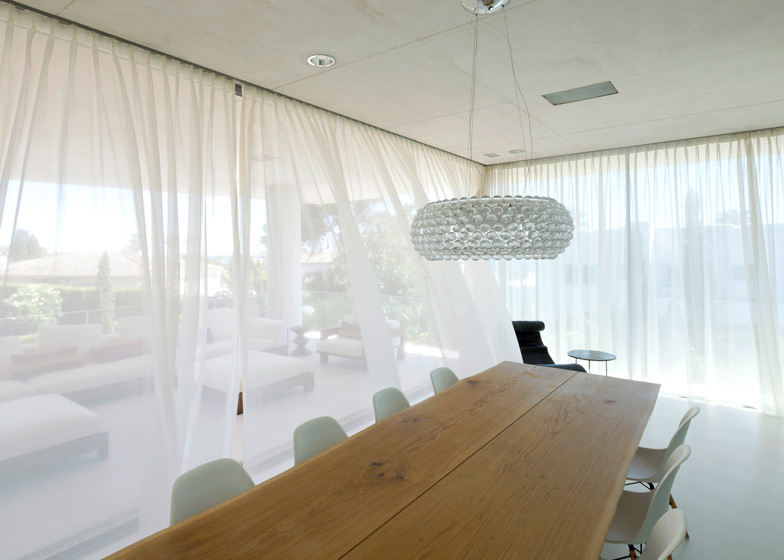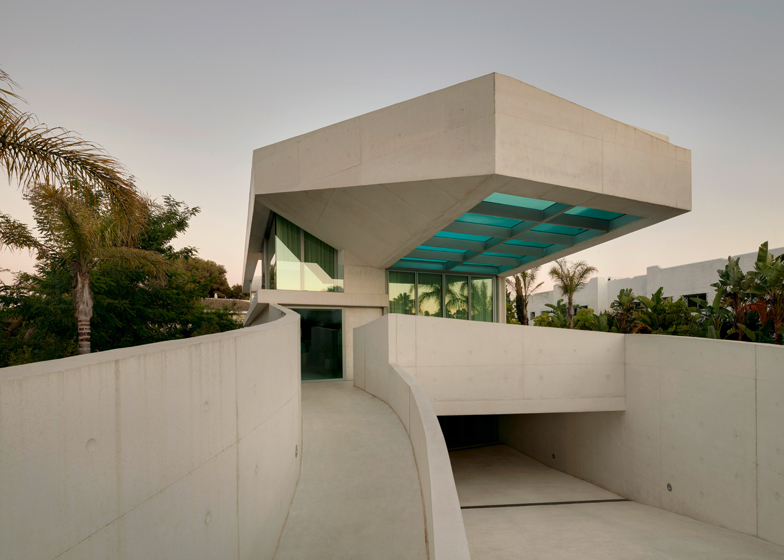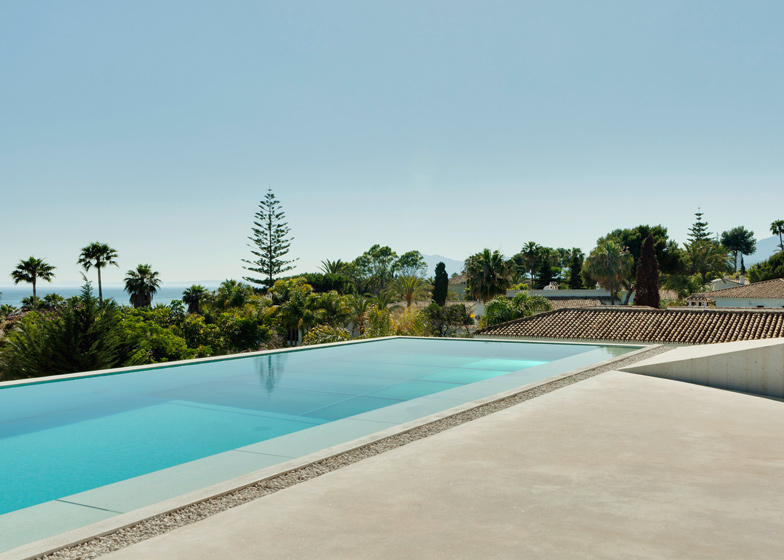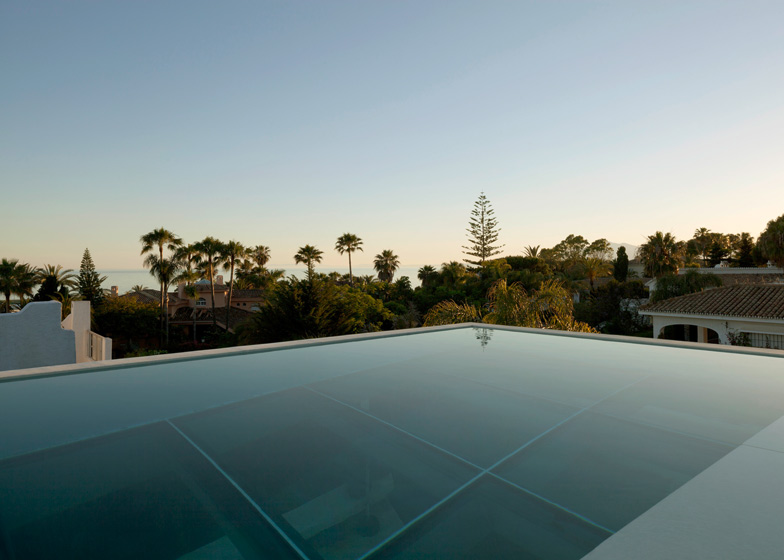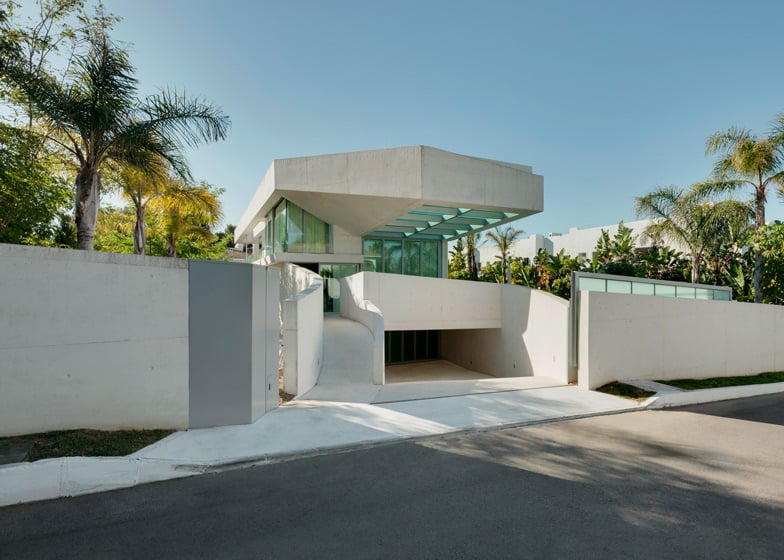A rooftop swimming pool with a glass floor cantilevers out beside the entrance to this house in Marbella, Spain, by Dutch office Wiel Arets Architects (+ slideshow).
Named Jellyfish House, the three-storey concrete residence was designed by Wiel Arets Architects with a rooftop terrace and swimming pool to allow residents to swim and sunbathe with a view of the Mediterranean sea over neighbouring houses.
The swimming pool projects out across a semi-enclosed terrace beside the house's main ground-floor entrance, projecting ripples of light onto the ground below.
The rear wall of the pool also features a large interior window, allowing residents in the first-floor kitchen to look out at friends and family taking a swim.
"The searing Spanish sun constantly filters through the pool's glass wall and floor, creating ripples of iridescent turquoise reflections throughout the entire house," explained the design team.
Another indoor window creates a view through from the kitchen to a living room below the pool, where glass walls slide back to open the space out to the elements.
Staircases are also exposed to the weather and are divided into "fast" and "slow" routes, just like V House completed by the same architect last year.
The gently inclined slow route spans the length the house, connecting all three floors with the roof terrace, while the adjacent fast stair offers direct access from the exterior to the roof.
Five bedrooms are shared out between the ground and first floor of the building. On the ground floor, two single bedrooms share a central en suite bathroom, while a master bedroom sits beyond.
Two guest bedrooms can be found on the partially submerged basement level, which emerges from the ground at the south-eastern end of the site to offer a secluded extra terrace.
"Taking full advantage of the ever-present Spanish sun, the Jellyfish House is an avant-garde expression of luxurious living," said the designers. "As most of its facades can be opened and as its staircases are mainly outdoor, the house's ever shifting boundaries between inside and outside are curiously blurred."
Other unusual details include a service elevator that allows food and drink to be sent up from the kitchen to the roof, televisions and audio devices that are recessed into the walls, and a first-floor sauna and steam room.
Photography is by Jan Bitter.
Here is some information from the architects:
Jellyfish House
Located in Marbella, on the Mediterranean coast of Spain, the Jellyfish House's neighbouring buildings block its view onto the nearby sea. Appropriately, it was chosen to cantilever the house's pool from its roof, so that the beach and sea can always be seen while sunbathing or swimming.
The house is organised around two paths of circulation: a 'fast' and 'slow' set of stairs, which intertwine and traverse the house's four levels of living. The 'fast' stair leads from the exterior directly to the roof; it is enclosed in glass, which physically separates it from the house's interior, yet it is simultaneously open to the exterior elements, so that sand is not brought into the house when returning from the beach. The 'slow' stair - whose long treads and short risers lend it its name - spans the entire length of the house, from ground floor main-entry to roof; it is indoors yet also open to the exterior elements, further amplifying the house's capacity for 'interiority'.
The house's rooftop pool is cantilevered 9 m southwest - toward the Sierra Blanca mountain range in the distance - and weighs nearly 60,000 kg. Equipped with an infinity-edge, its water merges with the sea in the distance. This pool has a glass-bottom floor and a panoramic window at its interior facing edge, both of which are 6 cm thick; the latter allows those in the kitchen to voyeuristically view those swimming, while a third window affords those in the kitchen a glimpse of the living room, whose terrace extends under the cantilevered pool.
The searing Spanish sun constantly filters through the pool's glass wall and floor, creating ripples of iridescent turquoise reflections throughout the entire house. As such, the pool can be seen and experienced from nearly all areas of the house. Integrated within the pool is an underwater bench, which traces its length and also integrates a pool cover, so that it is out of sight when the pool is in use.
Five bedrooms are located throughout the house, with two guest bedrooms situated on the basement level that face outward and onto an extensive private terrace for the exclusive use of guests. As the 'slow' stair leads from the main entry to the guest bedrooms below, this area of the house is able to function as a separate entity.
The kitchen is strung along the southern facade of the house's first floor, with all secondary appliances built into an adjacent and perpendicular hallway. The first floor is also the location of the sauna and steam bath. A small service elevator also allows, for instance, food and drink to be brought from the kitchen, or any other floor, up to the rooftop pool and terrace. This roof terrace features an oversized and custom-designed concrete table with an adjoining bench, which is contiguous to an angular chair for reclining while sunbathing.
The house's structure is composed of poured in place white-concrete, supported by one column at the right-rear edge of its pool, and several smaller columns near the rear-dining terrace. All non-concrete walls were constructed with glazing, which allows sunlight to permeate the house. Multiple bedroom closets, whose obverse faces the ground floor hallway, are finished in translucent glazing to compound this sunlight diffusing strategy. Oversized and accordion-like folding panels of translucent glazing adjoin each dining or entertaining space, which, when opened, essentially expands the house's numerous areas of living by nearly doubling their size.
All of the house's audio-video equipment - such as its countless Bose speakers - are recessed into its ceilings and walls, which allows them to disappear within their context little noticed. Lighting illuminates all corridors and staircases, as well as underwater within the pool, ensuring the rippling effects of its reflections that shimmer through its glass floor and wall can also be experienced throughout the house at night.
Taking full advantage of the ever-present Spanish sun, the Jellyfish House is an avant-garde expression of luxurious living; as most of its facades can be opened, and as its staircases are mainly outdoor, the house's ever shifting boundaries between inside and outside are curiously blurred.
Location: Los Monteros, 29600 Marbella, Spain
Program: Housing
Size: 650 m2
Date of design: 1998-2001
Date of completion: Winter 2013
Project team: Wiel Arets, Bettina Kraus, Lars Dreessen, Dennis Villanueva, Carlos Ballesteros
Collaborators: Paul Draaijer, William Fung, Johannes Kappler
Client: Private
Consultants: West 8, ABT BV, Cauberg-Huygen Raadgevende Ingenieurs BV, Nieto Sobejano Arquitectos S.L.

